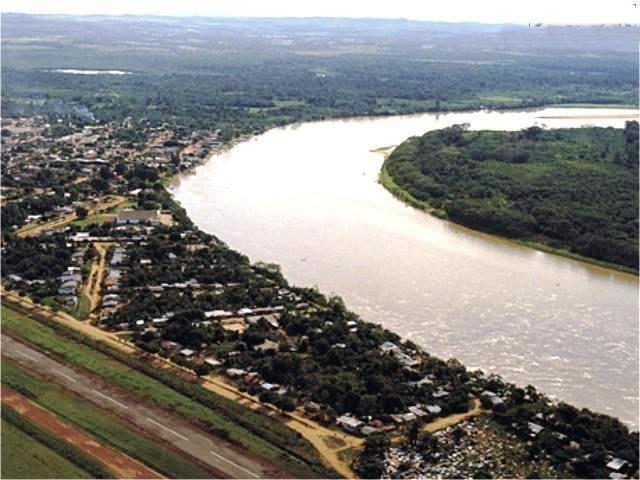San José del Guaviare, Guaviare, Colombia
Suggest Place to Visit
1187
Track to location with GPS |
 |
Especially on the banks of the rivers of the region, indigenous peoples of the Guahibo linguistic families (such as the Guayaberos and Sikuani) and the toucan, as well as the Tinigua, Carijonas, Cubeos, Kurripakos, who live in hunting, fishing and horticulture. . The interior of the jungle has been sheltered from the beginning by the nukak or the macus.
At the beginning of the 20th century, several settlers entered the region through the Guaviare River and built their ranches on its right. That was the point, and then Calamar began to use rubber tappers in his path, and little by little he formed the town-origin of the current departmental capital; It happened in 1910. Homero Benjumea, Dionisio Rodríguez, Pablo Espitia, Felix Restrepo, Carlos Durán and Nepomuceno González, who will be released on March 19, March, March, March, San José and José added the name of the river. When he founded Mitú in 1931, by Miguel Cuervo Araoz, commissioner of Vaupés, and was transferred to the capital of the community, Calamar, which was the town where he worked, he disappeared, but in exchange, San José del Guaviare experimented with a great rise. . In the trips that were made between San José del Guaviare and Calamar, several settlements originated, among which is the current municipality of El Retorno.
In 1943, there was a commercial impulse with the creation of the first primer and in 1950 the first church and school were inaugurated. In the violence of 1952, the houses were burned and its inhabitants dispersed to return to the time, in order to rebuild the town almost in its entirety; in 1958 the first fishing company was created.
As of June 7, 1976, when San José was built in the municipality, it experienced a period of continuous progress and growth. On July 5, 1991, the new Political Constitution of Colombia was created in the department category in the Guaviare police station, so that San José became the departmental capital.
San José del Guaviare (Capital of Colombian hope) is the capital of the department of Guaviare in Colombia. It began to be formed in 1960, linked to the colonizing activities of the wild region and as a nucleus of support for them. In 1976 I received the status of the municipality and its population growth, since then, has been projected rapidly.
San José del Guaviare, the capital of the department of Guaviare, is located in the northern part of this political-administrative division, in an area of 42,327 km2. The municipal seat is located 175 meters above sea level, approximately 400 km from the city of Bogotá. Their territories are mainly flat, corresponding to the transition between the Orinoquía and the Amazon, and are watered by numerous streams of water, among which the Guaviare and Guayabero rivers stand out, which are also read to communicate with the surrounding populations, inside and outside from the Department. The Inírida River serves as a boundary in the south of the municipality.
Most of the territory is made up of tropical rainforests and gallery forests, even in the northern part of which there are natural savannas. In the areas of influence of the carriages and trails that leave from the municipal seat and in various colonization points, lands where the forests have been replaced by different crops or pastures have been intervened.
Share with the department of Meta, the Serranía de la Macarena National Natural Park; with the department of Caquetá, the Chiribiquete National Natural Park; and with the municipality of El Retorno, the natural reserve of Nukak. The nukak guard covers more than 20 due to the extension of the municipality. In addition, with several guards Guayabero, Sikuani, Toucan, Desano, Piratapuyo and Kurripako.
In the region there are attractive landscapes of singular beauty, such as the Cordillera de Chiribiquete, declared a natural national park, which has spectacular vertical vertical walls, and numerous rivers with their rivers surrounded by thick jungle; Highlights as tourist attractions are the mountains of San José and La Lindosa with their cave paintings, the rocky outcrops of the ´´Ciudad de Piedra´´, Natural Bridges and Los Túneles, the Inírida and Espejo rivers, the Tomachipán river, the Sabanas de La Fuga, Cascada del Amor and Las Delicias, the Rincón de los Toros and the natural spas Agua Bonita and Villan Luz.
Economically, the municipality of San José del Guaviare depends mainly on the agricultural and fishing sectors and on specific service provision activities.
Guaviare's economy is based mainly on agriculture: bananas, cassava, cocoa, honey cane and rubber. Fishing and livestock are another fundamental line in the department's economy. The main artisan products are the scissors and strips made with chiquichiqui palm fiber and other handicrafts made for the most part by the indigenous people.
The municipality is connected to the national highway through a truck that crosses the Eastern Plains and reaches Villavicencio; This truck continues to operate, linking the municipality with El Retorno and Calamar.
The Guaviare River allows the navigation of larger and smaller vessels; with river inspection, located in San José del Guaviare. Air service is one of the main means of communication; lends itself to aerodromes located in the municipalities of San José del Guaviare and Miraflores that communicate with each other, with the region and with the capital of the Republic.
San José del Guaviare, a settlement surrounded by natural streams, rivers, rocky hills, lagoons and pictographs, rises as a capital on the edge of the mountain and the jungle.
Chiribiquete Natural Park:
Serranía de San José
Cave paintings of the Guayabero River: they are classified as the oldest antiquities in America. They are located 40 km from San José, it is a great road in which figures of men, animals and red signs referring to dances have been found.
The beautiful lagoons, the Rincón de los Toros, La María and Aguabonita, are other places of great beauty that can be reached in search of bathing areas. The wells, by the bus that leads from San José to Retorno, is a small river with a stone floor. Along this same path, without going through the Nuevo Tolima torch, it connects with the Stone Town 20 minutes from San José, it is a large rock formation that in the morning is covered with vegetation, but close to the entrance. a series of caves connected by labyrinths, which create an amazing sensation for those who visit them.
Another curious place on the natural bridges. They are rock formations that form natural steps.
Yurupary de Oro International Festival in San José del Guaviare
The Yurupary de Oro International Festival is of a folkloric nature, it calls and exhibits the different artistic manifestations of the usual costumes, assembling the spontaneous verse, which creates the agility of the copleros in rhythms of guacharaca, kirpa, zumba that zumba, six numbered, among others . Confront female and male vocations in reciprocal song and song passion, competing in traditional dance programs in 8722, Sabanero and 8722; and the gym dance.
In each version of the event there are other components that make it increasingly attractive, such as the sports collection in the collection, the lanyard parks and, to ensure broad participation in this event, the Novela Voz Llanera del Guaviare, which is responsible for con the participation of singers from the four municipalities of San José, in addition to a children's music contest.
Comments
We don´t have yet any comments about:
San José del Guaviare
San José del Guaviare
Be the first to leave a comment as it is very important to inform other people
Outros locais a visitar
Within a radius of 20 km from:San José del Guaviare
Unfortunately we do not have information on other places to visit in this area yet
Hotel reservation near San José del Guaviare within a radius of 20 km
No results
Why to book with ROTAS TURISTICAS
The best prices
Our partnerships with the world´s largest operators offer research on the best market prices.
More options
At Rotas Turisticos you can book the hotel, buy the air ticket, book the transfer from the airport to the hotel and vice versa, book the local excursions, rent the car, take travel insurance and consult the places to visit and where to go.
Holiday Tips & Destinations
Hundreds of holiday destinations with all the options that allow you to easily choose the destination that best suits your dream vacation.
ROTAS TURISTICAS
Links





